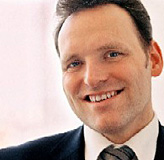Armin Sandhoevel: During our first year, we were able to secure a number of important cooperation agreements within markets such as solar markets in southern Europe and the global carbon market. Most importantly, we are already seeing a close collaboration between the different companies of the Allianz Group. Today, we support climate-centric solutions for the whole group, be it in Asia, North America or Europe. That would be my top criterion for assessing our success so far.
Allianz Climate Solutions: Warming up to business
Allianz Climate Solutions was launched almost a year ago, August 2007. What has been the most important success so far?

Why should an insurance company offer climate solutions?
Sandhoevel: Climate change has a direct impact on the insurance sector. More than 40 percent of all losses worldwide are closely related to natural catastrophes. If you look at which sectors have a direct impact on climate change, it is of course a lot of utilities, but in the end, insurance companies are also affected.
This is also why we have been developing a number of more sophisticated investment vehicles/products which also help to mitigate the risks of natural catastrophes, like flood bonds or catastrophe bonds that cover business interruption.
What are the fields you are working in and why?
Sandhoevel: Our main task is to act as investment brokers in the renewable energy sector, mainly solar power. This means we offer acquisition, assessment, and brokerage of renewable energy projects within Allianz, but also as a service for our customers.
The second function of Allianz Climate Solutions is to conduct research for Allianz Group companies. We produce reports on the risk exposure of different projects, also for our retail business at Dresdner Bank. Part of this is also acting as a competence center for renewable energy, as well as on issues such as the carbon market.
In the past, I was responsible for the risk management of carbon dioxide (CO2) emissions trading at Dresdner Bank. One result of that is the joint venture between Dresdner Kleinwort and Gazprombank on CO2 emissions trading.
And finally, we act as solution provider to our group companies if they need specific expertise for climate-related products. This ranges from weather derivates for retail customers to the development of ECOMotion which enables customers to "neutralize" their CO2 emissions through the purchase of CO2 mitigation certificates in combination with their motor insurance.
You mentioned the carbon market. What kind of business can you actually generate with carbon dioxide?
Sandhoevel: The core of the carbon market is CO2 emissions trading. You buy CO2 certificates from companies that have too many, and sell them to companies that need them. For us, it is important to combine this carbon trading with specific products like forwards, options or swaps for example, or insurance products for business interruption that also cover the losses of companies that emit too much CO2.
Allianz offers structured products like climate awareness bonds or spot market trading with the EU emission trading certificate. We have done a lot of research at Dresdner Kleinwort that is important for our clients, and of course, our joint venture with Gazprombank is generating CO2 certificates in Eastern and Central Europe. Last but not least, you can invest directly in companies or indirectly into CO2 certificates and create investment funds.
Is there another area that you are particularly interested in?
Sandhoevel: Solar energy makes up about 80 percent of our work in renewable energy. We are also looking closely at the bioenergy market. But there are a lot of regulatory problems with bioenergy, and other important issues to address such as the competition between food and biofuel production.
So we are monitoring bioenergy, but we are not doing a lot of financing. We started in 2005 with a center of competence for renewables within Dresdner. At that time, around 40 to 50 percent of all inquiries for financing were into bioenergy and we were able to build up a lot of expertise in this sector.
The main question is, what are the drivers for the different sectors? One is obviously the market price for fossil fuels, but the most important driver is the regulatory framework, especially for subsidies and supporting schemes for renewables. This means that we have to assess and follow the development of the political and legal situation within several countries.
In Germany, for example, we are a member of the German government body on emissions trading as well as of various renewable energy associations. The aim is to get relevant information at a very early stage so that we have time to react.
Most of your projects are focused on solar power, with Germany being the most important market here. Will this boom last?
Sandhoevel: In Europe, 80 percent of the accumulated installed capacity for solar power was German. In 2007, 80 percent of the annual installed capacity was also in Germany. The rest comes from Spain, Greece, Italy and Portugal.
Germany, however, is totally driven by its subsidy schemes. That is why we have a very well-established market. But this dominance by Germany will definitely change. We already have very active and growing markets in the Unites States, Japan, China, India, South Korea, and in Southern Europe.
Where would you like to see Allianz Climate Solutions in ten years?
Sandhoevel: Our aim is to be a strong and integral part of the Allianz Group, and to be the first choice of our group companies and customers on all possible climate solutions. Ultimately, we want to contribute significantly to increasing the markets for renewable energy, clean technologies, and the carbon management.
This interview was first published on the Allianz Knowledge Partnersite.
As with all content published on this site, these statements are subject to our Forward Looking Statement disclaimer.
Link to the disclaimer